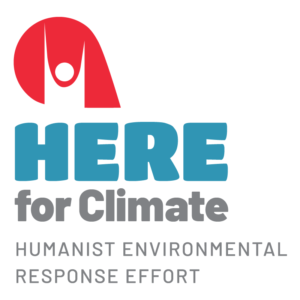A Better Future through Climate Justice

Climate change is a massive issue for the current and future health of the planet and all that exists on it. It’s a complex issue involving a broad range of contributing aspects and a variety of consequences. In early 2021, the American Humanist Association’s HERE for Climate initiative will offer a four-part online series to continue the conversation started in our May 2019 open lecture series Climate Justice: A Better Future for Us All, parts of which were excerpted in the July/Aug 2019 issue of Humanist magazine. This new series will highlight the challenges climate change brings to communities in relation to energy, equity, and health, along with how we create equitable and effective solutions moving forward.
Each of the four sessions will focus on a different aspect of climate change:
Solutions for Food, Energy, and Water Challenges Faced by Indigenous Communities
January 14th, 2021 7:00 – 8:30 pm EST
Join us for a presentation from Dr. Karletta Chief, about food, energy, and water challenges faced by Indigenous communities. Dr. Chief will also discuss Indige-FEWSS, a program based out of the University of Arizona that explores a path to solutions for the Navajo Nation with the help of students, professors, and professionals. Dr. Chief is an Assistant Professor and Assistant Specialist in the Department of Soil, Water, and Environmental Sciences at the University of Arizona and Principal Investigator for Indige-FEWSS.
A More Equitable Future in Environment, Economy, and Energy
January 21st 2021 7:00 – 8:30 pm EST
Join us as we learn about and discuss ways to ensure a more equitable future. Dr. Jennie Stephens will present on justice in climate and energy and how to create necessary, effective solutions. Dr. Stephens is the Director of the School of Public Policy and Urban Affairs at Northeastern University and author of Diversifying Power: Why We Need Antiracist, Feminist Leadership on Climate and Energy.
Our Health and the Environment
January 28th, 2021 7:00 – 8:30 pm EST
This event will host two speakers discussing the connection between human and environmental health and the ways climate change is affecting the health of communities.
Gloria E. Barrera, MSN, RN, PEL-CSN currently works as a certified school nurse at a public high school outside of Chicago, and as an adjunct professor of nursing at several universities. She is committed to being a lifelong learner and continues her efforts in improving child health outcomes in vulnerable populations through her current practice, advocacy, and teaching.
Eugenia Gibbons is the Boston Director of Climate Policy at Health Care Without Harm. Her expertise includes energy efficiency, as well as equity and climate justice. For more than a decade, Eugenia has worked to build partnerships across interests and sectors in New England to advocate for, develop, and implement state climate solutions that are sustainable, affordable, equitable, and achieve deep greenhouse gas emission reductions.
Where Do We Go from Here? Solutions for the Environment
February 4th, 2021 7:00 – 8:30 pm EST
The final event of the series is a panel featuring three speakers focused on exploring answers to questions surrounding the future of the climate movement. The speakers will include Carolyn A. Sims, Keith Kinch, and Joelle Novey.
Carolyn A. Sims is a Senior Advisor on the Policy Engagement team within the Local Public Affairs department at Southern California Edison (SCE), where part of her responsibilities include leading the external engagement strategies for environmentally impacted and low-income communities.
Keith Kinch serves as co-founder and General Manager at BlocPower, a Brooklyn-based technology startup that retrofits buildings. Since their founding in 2012, the company has completed almost 1,000 buildings, cutting energy-related costs for those buildings by 20-40%.
Joelle Novey directs Interfaith Power & Light (DC, MD. NoVA) through which congregations of many traditions across the region—including the Washington and Baltimore Ethical Societies—are coming together to respond to the climate crisis as a moral issue. She speaks widely across the region on the role of religious communities in the climate movement.
Join us and learning from these professionals through their engaging presentations and conversations. Each session will be held on Zoom Webinar and recorded. For more information about how to attend go to: https://hereforclimate.org/events/series/
You can also check out and explore the HERE for Climate website to see more of and support our climate justice work at hereforclimate.org.
